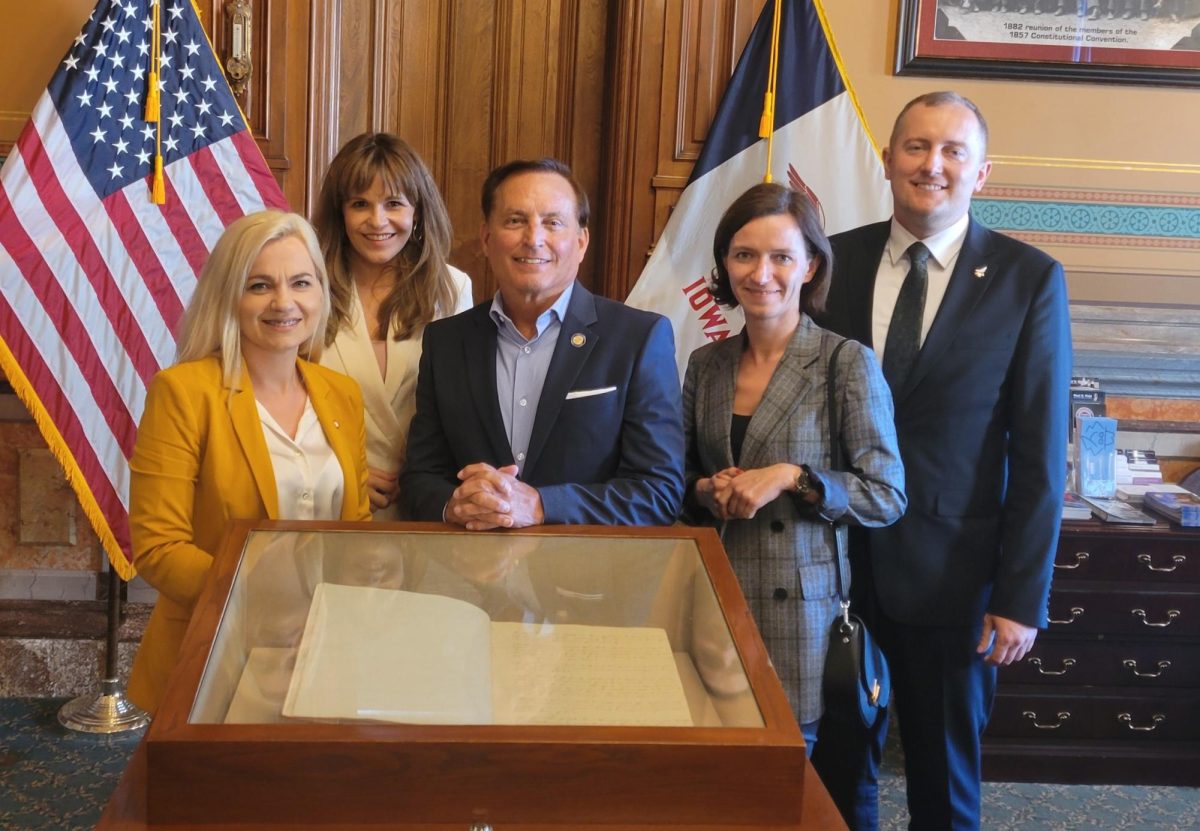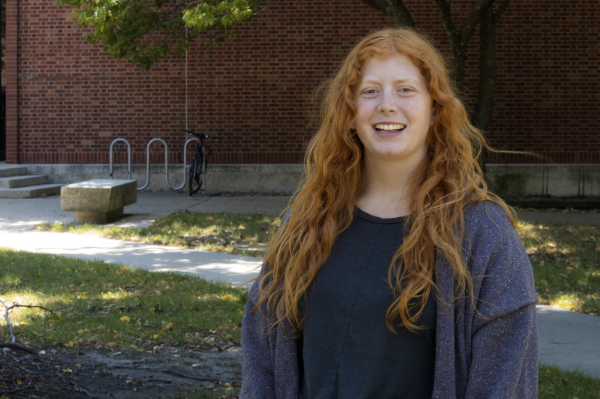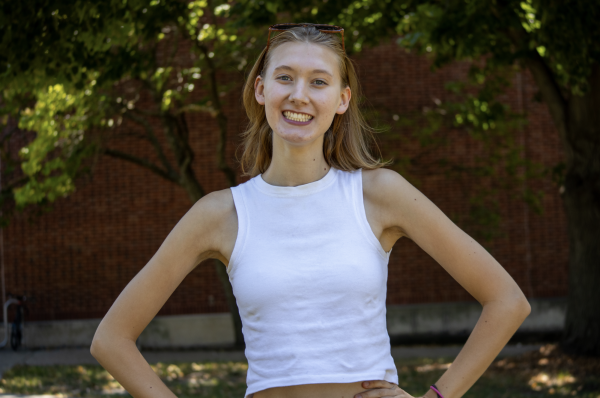Parliamentarians traveled thousands of miles from Poland’s mountainous country to the heartland. On Sept. 24, the Polish parliament members visited Drake University and met with students from one political science course on the European Union, and members from Drake Democrats and College Republicans. Ms. Malgorzata Gromadzka, Ms. Dorota Zofia Olko, Ms. Weronika Anna Smarduch, and Mr. Piotr Strach represent areas in Poland encompassing Biłgoraj, Warsaw, Nowy Targ and Czestochowa, respectively.
Drake University Professor Kieran Williams, who teaches Modern European Political Systems, organized the visit with the members of parliament.
“Iowa International reached out to us to do a briefing on American politics,” said Williams. “And I said I’d like to involve Drake Democrats and College Republicans, and while we’re at it, could we time it so that they can come to [my] class.”
Students expanded their knowledge of the European Union by engaging the panelists in questions ranging from energy conservation to the war in Ukraine and Iowa’s role in U.S. politics. For the rest of their visit, the MPs plan to tour and engage with Iowa agriculture sites, facilities affiliated with the U.S. military forces and other universities.
Carissa Phan, junior, thought it was a unique experience to hear from members of the Polish parliament.
“Hearing their perspectives on the Ukraine-Russia war, especially considering their proximity to the war, was very insightful,” said Phan. “I also enjoyed hearing about their perspective on U.S politics and how they believe our country is divided.”
The Open World Program, funded by the Library of Congress, is a professional exchange program with Poland. While other professions can visit the U.S. through Open World, this tour was politically motivated, focusing solely on members of Poland’s Parliament. Through the Open World Program, members of the Polish Parliament started their trip to the United States by meeting with U.S. politicians in Washington, D.C.
The Iowa International Center helped plan the second half of their visit to the United States, including the visit to Drake University. As a member of the parliament committee for higher education, Olko said she saw this visit as the most important part of the trip. She said it was a great chance to listen to a lecture about the American political system, state initiatives and policymaking.
Olko said it is always great to meet students from other countries and see what is most important to them. Olko thinks what they ask and know about Polish politics is interesting. Olko took this opportunity to answer questions about European politics and being a member of parliament.
“I think it can be interesting for the students to talk about European politics. We got to talk about what it is possible to achieve in the framework of the European Union,” Olko said. “It can be interesting to hear about the practical side of parliamentary work and compare it to what they hear from American politicians. We have many problems and challenges in common.”
Outside of class, members of the Polish parliament met with representatives from Drake Democrats and Drake College Republicans. The groups talked about campaigns, how to engage friends in elections, which stage of elections interests them and why they view state elections as important. Students listed issues such as taxation and abortion laws as reasons they believe state elections are essential.
Olko received issues such as taxation and abortion laws as answers to the last question.
“It was great to hear what interests were important to them at the state level because it is not obvious to us,” Olko said. “The answers were characteristic of the party, something we could have expected, but it was really nice to hear it as an answer to the state elections.”
At the end of the visit, the members of parliament gave interested students their business cards. Olko said she hopes to stay in contact with Williams and other Drake faculty members and continue the relationship between Drake and the Polish Parliament.
“I think it could be useful in the frameworks of other programs to be in touch and know somebody you could write to,” Olko said. “From now on, when I see somebody or something connected to Drake University, I will be more interested.”
Olko said more young people need to be involved in politics. Engaging young people in politics is essential because of issues such as climate change that older generations are less passionate about, said Olka. She added that the younger generation is also the expert on communicating with their peers and bringing them together through social media.
“We need all generations in politics to get a better understanding of today’s world,” Olko said.
Olko said future politicians should go abroad to gain context and observe problems in other countries. Olko believes a more internationally connected group of politicians will help unite social movements and solve global issues.
“We live in a globalized world, so each part of the world has some influence on the others. For example, we can not handle climate issues alone; we have to do it all together to be successful,” Olko said.
Hoping to continue connecting higher education communities from various countries, Olko said Poland hosts an annual festival, Campus Polska, for college students actively engaging in social justice and political activism in Poland. All the universities in Poland come together to organize this festival, and students worldwide are invited.
Weronika Anna Smarduch discussed how the frequent U.S. elections often create a sense of fatigue with American voters. Poland only has elections every five years.
“In the U.S., because you’ve got a lot of elections, people aren’t going to vote,” Smarduch said. “But [in Poland] we’ve got a [large] amount of people that go to parliamentary elections, and then we’ve got local elections and the EU’s elections.”
The importance of voting rings just as true for the Polish Members of Parliament as U.S lawmakers have been voicing.
“You have to go to vote,” Smarduch said. “Because it is the only influence we have in our countries. Go vote.”
The MPs also discussed Iowa’s agriculture scene.
“It can affect the value of the future of the society,” Strach said. “I think you need to diversify more. As a country, you already produce lots of different types of food. Meats and wheat and vegetables. [Iowa] should use [their] fantastic soils for something more than corn and soybeans.”
In addition to their agricultural interests, the MPs also noted the critical difference in how surprising it was how Iowa handles their product and food waste. The EU has strict methods in place for disposing of waste.
“One thing that is more difficult here is recycling,” said Strach. “In Europe it is very well developed, There are many types of trash, and we segregate at home. [In Iowa], there are not very many occasions [to separate between different colors and types of plastic]. In our opinion, the best, most effective recycling is at the source.”
One thing that the U.S and Poland both share is a mixture of complex and differing views on abortion. Just as abortion is a center stage issue this election cycle, it is also an important policy issue that members of the Polish Parliament are trying to work through. Currently, Poland has one of the most restrictive abortion laws in the EU. Malgorzata Gromadzka remains steadfast in her view that Poland should revert its course regarding its government’s role on matters involving abortion.
“I just think that women are supposed to decide about our bodies, our health,” said Gromadzka. “The government shouldn’t tell us how we know it’s supposed to be. It really is a bad situation for women in Poland.”
In general, Weronika Anna Smarduch found there to be more similarities between the U.S. and Europe than differences.
“I think Europe and the U.S are similar,” said Smarduch. “Because a lot of the USA was made by European people. So when I arrived here, I looked around and I thought it’s like Europe but with a lot more space.”
The Polish members of Parliament will return to Washington, D.C. to meet with American legislators before they make their way back to Poland.











Peter Strach • Oct 9, 2024 at 9:20 am
It was a great pleasure to visit your state and talk about thigs that we can learn from each other.
Caroline Siebels-Lindquist • Oct 10, 2024 at 8:07 pm
Same to you! We enjoyed meeting you and your fellow Members of Parliament.